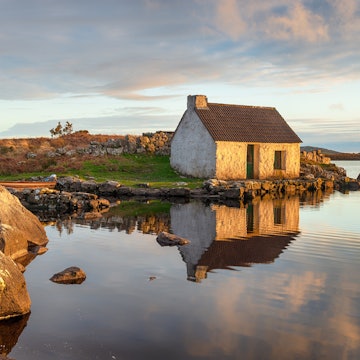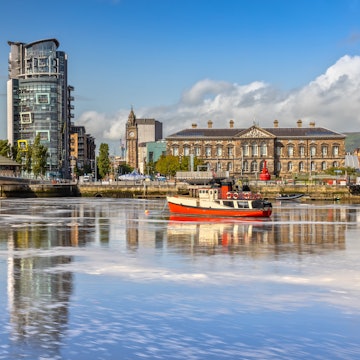
First time Northern Ireland: a small destination with Titanic appeal

Apr 18, 2018 • 5 min read

Northern Ireland's natural wonders include the Giant's Causeway, top of many a first-timer's wishlist © S-F / Shutterstock
Northern Ireland’s charms draw more and more visitors each year. First timers head straight for the Giant’s Causeway, a worthy destination but only one star in a constellation that twinkles with many others. Sip whiskey at the oldest distillery in the world. Visit Titanic Belfast and learn the story of the world’s most famous ship. Stroll the walls of Derry to uncover local history. And be won over by the friendliness, knowledge and enthusiasm of the people. Your first visit won't be your last.

Stats
Population 1.8 million
Visitors 3.8 million
Daily budget £110
Food to try Champ (mashed potatoes with spring onions – delicious)
Best time of year to go April to September
Number of Game of Thrones doors made from a fallen ‘Kingsroad’ tree 10 (and you can visit all of them)

Areas & sights
Northern Ireland is geographically part of the island of Ireland and politically part of the UK. It’s the smallest of the latter’s constituent countries but crams in a lot, and three key areas, running from east to west, reward first time visitors with a good selection of highlights. If you’re a Throner (if you don’t know what that means, then you’re not) you will definitely have a few GoT-related places on your checklist – for a great overview of what’s what and where, take a look at the Discover Northern Ireland website.
Belfast
The change in status of NI’s capital over the last 20 years, from must-avoid to must-visit city, has been dramatic and well deserved. Building on a substantial architectural heritage, with City Hall the jewel in the crown, Belfast has blossomed on the back of the peace process. Two areas in particular are now top tourist attractions: the Cathedral Quarter, where excellent restaurants, bars and hotels flourish; and the revamped riverfront district known as the Titanic Quarter. The perfect day would begin in the latter with a visit to Titanic Belfast, a museum dedicated to the story of shipbuilding in the city and the eponymous, ill-fated vessel which was built here. Over in the centre take a tour of City Hall and lunch at Home, followed by more museuming at the Ulster Museum and a stroll round the Botanic Gardens. Grab a drink at the beautiful Crown Liquor Saloon and then drag yourself away for a Black Taxi Tour to see the murals and hear the stories of Northern Ireland’s recent, troubled past. Round off the day with dinner and some live music in the Cathedral Quarter, and bed down in either the hipster-favourite Bullitt Hotel or the super-slick Titanic Hotel.

The Causeway Coast
You can’t, and shouldn’t, miss the Giant’s Causeway on any trip to Northern Ireland – Unesco (this is NI’s only World Heritage Site) and 40,000 basalt columns can’t be wrong. Whether you believe giant Finn McCool constructed it (he didn’t) or cooling lava did the job (it did), this is a spectacular sight, and the best way to enjoy it and the rest of the coast is to take a hike. The path joins enticing dots like the Carrick-a-Rede footbridge (head for heights required) and Dunluce Castle, exactly what a ruined fortress should look like, via dramatic cliffs offering photogenic views. To toast your hike, raise a glass at Old Bushmill’s Distillery, the world’s oldest licensed whiskey producer, and have a meal at pretty seaside town Portrush.

Derry-Londonderry
Divisions over what to call it don’t detract from the appeal of Northern Ireland’s second city. Start a visit by walking the 400-year-old walls. Pop into the Tower Museum for a further dose of history and a great view, then take a look inside the Guildhall before strolling over the Peace Bridge in search of fine food at Brown’s Restaurant. For a ‘fortified’ sleep within the city walls, bed down at Bishop’s Gate Hotel, where real fires and stylish rooms await in a former gentleman’s club.

What to pack
OK, so there’s a reason Northern Ireland is ridiculously, beautifully green and that’s the rain. Which often comes at you horizontally. So forget umbrellas and pack waterproofs. And some good walking shoes. And a sweater for the evenings – even in summer it turns cool as the sun goes down.
Getting around
Belfast and Derry-Londonderry are both highly walkable. Outside the cities, NI’s trains will get you to or close to most major attractions. Tours are available for exploring the Causeway Coast but your own wheels will give you the freedom to explore in more depth and at your own speed (tours can be a bit rushed).

Safety
Fears of sectarian violence put people off visiting Northern Ireland for decades during the Troubles, but in the 20 years since the Good Friday Agreement kicked off the peace process there’s been a remarkable turnaround and today this is one of the safest places to visit anywhere. That said, you might want to avoid the mid-July Orange marching season when Loyalists (locals who are pro-UK) hold parades which sometimes result in small-scale trouble.
Etiquette
Politics People are generally willing to discuss the topic, but ask rather than tell when it comes to the subject of Northern Ireland’s political past and present.
Tipping 10% is fine in a restaurant (sometimes already added as a Service Charge – check the bill to avoid paying twice). No tip needed in pubs when ordering drinks.
Driving Drive on the left and note that distances are given in miles (if you accidentally cross over into the Republic of Ireland you’ll soon know because distances there are in kilometres).
Booking ahead
In the peak summer season it’s wise to book hotels, tours/car rental and restaurants as far in advance as possible. Buying online for Titanic Belfast will save some time when you arrive at the museum (you can skip the ticket queue). Carrick-a-Rede rope bridge’s popularity means a timed-ticket system is now in operation, but with no booking in advance so get there first thing in the morning (first tickets are sold for 9.30am) to avoid disappointment.
Clifton visited Northern Ireland with support from Tourism Northern Ireland. Lonely Planet contributors do not accept freebies in exchange for positive coverage.















